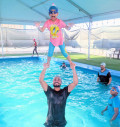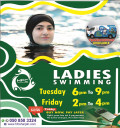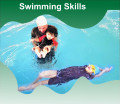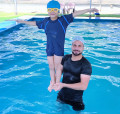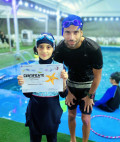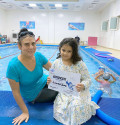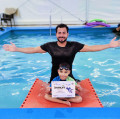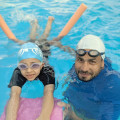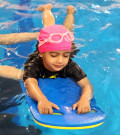
Beginner Tips for Mastering the Art of Swimming
2022-12-21 - Swimming
Swimming can be a great way to stay active, have fun, and build confidence. Keep in mind that you swim to have fun and enjoy yourself while you're in the water and try to make it as playful as possible.
Overcome the fear
Remember, it's completely normal to feel afraid of the pool, and it's okay to take things at your own pace. With time and practice, you can build your confidence and overcome your fear of the pool.
Follow some tips for overcoming your fear of the pool:
· Take it slow and don't rush into things. Start by getting comfortable in the shallow end of the pool and gradually work your way up to deeper water.
· Wear a life jacket or use flotation devices until you feel more comfortable and confident in the water.
· Practice good breathing techniques and try to relax as much as possible.
· Consider taking a lesson from a certified swim instructor, who can provide guidance and support as you build confidence in the water.
· Stay near the edge of the pool and don't venture too far out until you feel comfortable.
· Try to focus on the present moment and let go of any negative thoughts or memories that may be contributing to your fear.
· Don't be afraid to ask for help if you need it.
Feel more comfortable in the water
It's natural to feel anxious or nervous when learning to swim but try to stay positive and patient with yourself. Remind yourself that everyone learns at their own pace and that you will get there with practice and perseverance. Make sure to drink plenty of water before and after your swim to help you feel more comfortable and energized
· Start with shallow water: Begin in water that is chest-deep or shallow enough for you to stand up if needed. This will allow to feel more secure and get used to the sensation of being in the water.
· Use flotation devices: Flotation devices, such as kickboards or pool noodles, can help feel more comfortable and secure while you are learning to swim.
· Practice deep water skills: Once you are comfortable in shallow water, start practicing deep water skills. This can include floating, treading water, and swimming to the side of the pool.
· Use a swim instructor: A swim instructor can provide guidance and support to help you feel more confident in the water. They also provide personalized instruction to help the swimmer progress at their own pace.
· Take breaks as needed: It's important to take breaks as needed as this can help you feel more comfortable and relaxed in the water.
· Stay positive and encourage yourself: Encourage yourself and stay on positive mood. This can help you feel more confident and motivated to continue learning.
Hold your breath
An important skill to be learnt for swimming is holding your breath as it allows you to stay underwater for longer periods of time. This can be useful for a variety of reasons, such as diving where holding your breath can allow you to dive down to the bottom of the pool, swimming underwater for short distances. It is a useful skill for racing or for practicing your stroke technique. Being able to hold your breath can also help you feel more comfortable floating or treading water, which are important survival skills.
Moreover, it helps you improve your overall breathing control while swimming. This can be useful for practicing breath control during endurance sets. Therefore, learning to hold your breath can be an important part of becoming a confident and proficient swimmer. It's important to practice this skill in a safe and controlled environment, and to listen to your body and stop if you feel uncomfortable.
Here are some tips to holding your breath:
· Take a deep breath: Inhale deeply through your nose, filling your lungs with as much air as possible.
· Hold your breath: Close your mouth and hold your breath for as long as you can.
· Exhale slowly: When you feel the need to breathe, exhale slowly through your nose or mouth.
· It's important to practice holding your breath in a safe and controlled environment, such as in a pool or while standing in shallow water. If you feel dizzy or lightheaded while holding your breath, stop immediately and take a deep breath.
· It's also important to remember that everyone's ability to hold their breath varies, so it's important to listen to your body and stop if you feel uncomfortable.
· As you practice holding your breath, you may be able to increase the amount of time you can hold it. However, it's important to always do so in a safe and controlled environment.
Learn swimming the playful way
Taking swimming as a playful activity can be a great way to have fun while also adapting your body to a new skill. Here are some ideas for making swimming more playful:
A new skill can be learnt if a little of “fun” ingredient is added to it.
· Playing games in the pool, such as Marco Polo or Shark Attack can help you practice your swimming skills while also having fun.
· You can also practice floating or treading water and see how long you can stay afloat, try racing with your friends or playing tag in the water.
· Using pool toys, such as noodles, kickboards, or pool balls can help to make swim sessions more fun.
· Try the different strokes or techniques of swimming and find out the ones you enjoy the most. This can also be tried out by playing with different strokes in a relay race with friends.
· Take breaks and have fun in the pool. You can take breaks to play games, float, or just splash around.
Swimming is a great form of exercise that has a positive effect on mood, so getting in the pool can be a great way to boost your mood. Moreover, he sensation of being in the water can be very soothing and relaxing. As swimming proves to be a great way to improve your physical and mental health, and a source of good vibes and enjoyment, start your wonderful journey of swimming now….







.jpg)















































